7/8/12
Sixth Sunday After Pentecost
"Go"
2 Samuel 5:1-5, 9-10
Mark 6:1-13
I’m not Jesus.
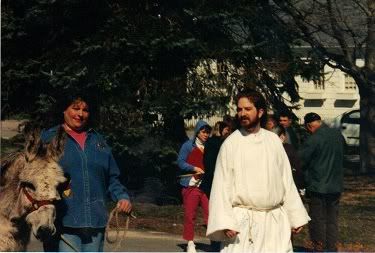
Ok, that is me, but I’m still not Jesus. However, when I read the Gospel lesson for this week I couldn’t help thinking about how I grew up in North Stonington Congregational Church, UCC. This is a picture of the Junior Choir.
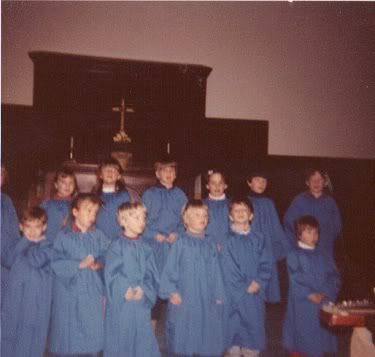
I'm in the first row, second from the right.
And here I am again, a little bit older—with a towel on my head. I think maybe having a towel on your head in worship is some kind of rite of passage that every child growing up in the church goes through at some point. At least I hope so, otherwise this picture might be embarrassing.

And here I am outside of the church with my Sunday School class—we’re showing off the banner we just made. I suspect that it’s still hanging up somewhere. Churches never get rid of those kinds of things, right?

Well, maybe I’m wrong. I don’t know what happened to this banner. I do know that this was my Confirmation Class.
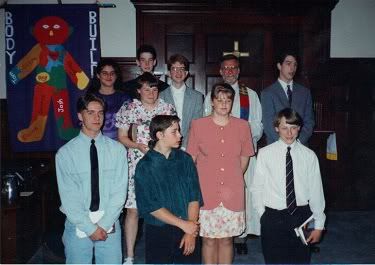
There are still plenty of people in that church who were there back then. People who watched me grow from that child into who I am today. And that’s a wonderful thing. So I understand why, when I was looking for a new call and the church in North Stonington was looking for a new minister, my friend Robin (who also grew up in the church—she's the one on the right below) said, “Hey Josh, why don’t you come be our minister?”
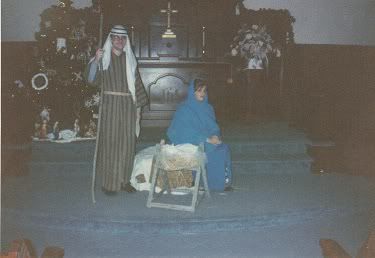
And do you know what I said to her? I said, “There’s no way I’ll ever serve a church that’s seen me in diapers.”

You see, the thing is, as much as I love that place and those people, the fact is that the people who helped you to grow up don’t hear you the same way that other people do.
I was about to say that it’s not actually that bad, but today’s Gospel lesson implies that it is, in fact, exactly that bad. Jesus has been out traveling, teaching and preaching and healing and driving out evil spirits both in the area surrounding Nazareth and across the Sea of Galilee in the gentile country of the Gerasenes.
Soon everywhere Jesus went a crowd followed. And last week we heard that even one of the leaders of the synagogue named Jairus came to Jesus to beg for a healing miracle. That’s the story where a woman was healed of a malady that had been troubling her for twelve years by simply touching Jesus’ cloak. It is also the story where Jesus raises a twelve year old girl from the dead.

So what happens next? Jesus goes home again. On the Sabbath he began to teach in the synagogue, but…

...yeah, that. The people said “Where’s he getting this from? Isn’t that just Jesus, the son of Mary?” They simply aren’t hearing him the way the rest of the world was. This is what Jesus meant when he told them, “Prophets are not without honor, except in their hometown, and among their own kin, and in their own house.”
Then the scripture goes on to say that Jesus could do no deed of power there, and that he was amazed at their unbelief. And that just feels strange, doesn’t it? I mean, Jesus is still Jesus, right? Son of God? Immanuel? God in the flesh? Yes, of course he is. But the people weren’t buying into it, they refused to see it—whether they understood or not, they actually turned down the chance to have some miracles. I've heard it described as if Jesus was a butane lighter and the woman with the hemorrhage was dry grass and kindling, Jairus was like firewood that’s been stacked in your basement, but the people of Nazareth… they were like wet hay—no matter how long you hold the flame to them, they just weren't going to catch. So the flame, Jesus, was just as strong as ever, you see?
So Jesus didn’t stand around Nazareth trying to force people who couldn’t hear and didn’t want to hear to accept what he was saying. He went out into the other villages and taught there, instead. And he called the twelve and began to send them out two by two, and gave them authority over the unclean spirits.
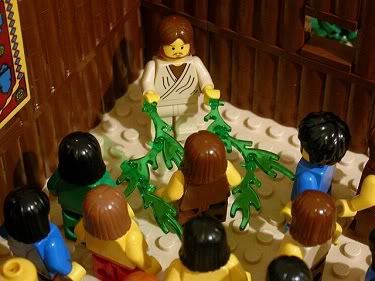
He ordered them to take nothing for their journey except a staff; no bread, no bag, no money in their belts; but to wear sandals and not to put on two tunics. This message, I think, is particularly difficult for us as Americans. We love our stuff. Even the simplest among us would bring a change of clothes if they had a set to pack, right? In fact, grabbing an extra shirt just seems prudent, doesn’t it? So what’s the deal?
I think that Jesus, as is so often the case, is refocusing his disciples on God. Do not depend on yourself for your food—depend on God. Do not depend on the money you carry—depend on God. Do not depend on yourself for clothing—depend on God. Do not, in fact, depend on anything you could carry in a bag—depend on God.
This isn’t the same thing as going out with no plan. For one thing, Israeli culture comes from a nomadic desert existence. Most cultures where people range from place to place have a very strong sense of hospitality—nomadic cultures that come from places where having a good place to stay for the night is required for survival have even stronger hospitality. What I mean to say is, Jesus could send his disciples out into Israel with a reasonable expectation that strangers would give them food, drink, and a place to stay.
Israel still has a reputation for being amazingly hospitable, by the way. Michael J. Totten, a foreign correspondent and foreign-policy analyst who has reported from the Middle East, the Balkans, and the former Soviet Union, once blogged about the subject of Israeli hospitality. He said that every time he publically announces that he’s about to make a trip to Israel, his “in-box fills with offers of generous assistance from Israelis who are total strangers. Most offered to buy him dinner. Some offered to let him sleep on their couch or in a spare bedroom. And a few even offered to show him around, introduce him to people—some even offered to set up appointments for him!
I do wonder, however, what Jesus would say to the Christian church in the US about all of this today? Would he send us out into the world with just a walking stick and the clothes on our backs? After all, if we’re honest with ourselves about the culture we live in, we have to admit that our sense of hospitality isn’t anything like it is in Israel. In America, as the saying goes, there’s no such thing as a free ride.
On the other hand, there are plenty of 250-year-old congregations meeting in 200-year-old buildings struggling to make ends meet as they literally pour good money after bad into heating and maintaining those beautiful, huge old buildings that haven’t been filled since 1950-something. I’ve often wondered what would happen if one of those churches sold off their building, rented some office space, and put all the money that they’d been throwing at their building towards mission and outreach?
I recently got into a huge Facebook discussion about church vitality with a fellow Andover Newton Theological School alum. She’s part of an activist movement that I suspect is a little too leftward leaning for me to get whole-heartedly behind—but being a part of that movement has put in her in contact with non-Christian activists. These are good people, ethical, in many cases "spiritual," but—she says—the idea of church holds no appeal for them. Even though they see Christian activists and recognize that their activism comes out of their sense of what it means to be Christian and live out the Gospel, nobody has asked her, “Where can I find a church like that?”
She has come to the conclusion that the church “…needs to stop being inside and go out into the world and serve, because that is what people can relate to. It is the only thing that will touch them, engage them, and make our faith claims mean anything at all.” So she left me with this question: “…how can we move the church out into the world? What will the body of Christ look like tomorrow, when the forms have crumbled and the buildings have been sold?”
Although she might be a little… vigorous, she’s not wrong. We can’t keep doing church as if it were 1950 anymore. The world has moved on. The good news, though, is that this isn’t the first time in the history of Christianity that the world has moved on. It’s ok if the current forms crumble—with the wisdom taken from all of the previous forms, we’ll build new ones. As for buildings, well, in all honesty, I believe that our church buildings—in most cases, anyway—will continue to be useful tools. As long as we remember that they are tools and figure out together how best to use them.
I don’t have all the answers. But there seems to be something to my classmate’s thought: the church needs to stop being inside and go out into the world and serve. Jesus taught in the synagogue—then he went out to the villages—then he sent the disciples out into the world. They stopped being inside and went out into the world to serve.
I’d be a little scared by the thought of it if I thought we were unprepared. But we aren’t unprepared. The Bible is full of examples of people who felt unprepared who turned out to be world-changers. Moses told God that he wasn’t a good enough speaker to change the world. Isaiah told God that he was a man of unclean lips. Jeremiah told God that he I didn’t know how to speak because he was only a boy. And David—dear goodness, David was far from perfect, but the people anointed him king over Israel anyway. And—and this is the important part—and David became greater and greater, for the Lord, the God of hosts, was with him.
So we have no excuse to hide here, in this building, to try to preserve something of the way the world used to be and let everything out there just go on changing without us. If we want to be disciples of Jesus we have to go out into the world and serve. It’s the only way to touch people, and engage them, and to have our faith mean anything at all.
Abiding God, Lord of hosts, be with us as we go out into the world. Help us to be greater and greater as we serve the world in the name of your Son, Jesus Christ, Amen.

No comments:
Post a Comment